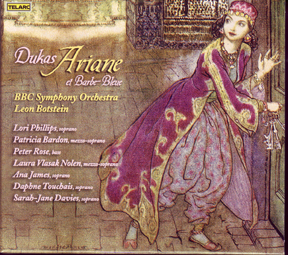
(845) 246-6944 ·
info@ArtTimesJournal.com
Bluebeard: the Legend, the Spoof, the Two Operas
By
FRANK BEHRENS
ART TIMES November 2007
 |
Many years ago,
I ran a miniseries about the Faust legend on the musical stage. The
recent recording on the Telarc label of Paul Dukas’ “Ariane et Barbe-bleue”
has spurred my interest to compare it with other versions and to see
what comes out the other end.
The
original legend, possibly based on an actual nobleman who lived in the
6th-century, might have been the basis for the version by Charles Perrault
that was printed in 1697. In this version, Bluebeard’s beard was really
blue and something of a put-off to prospective brides. (No one knew
what had happened to his first three wives.) He marries the youngest
daughter of a family, goes on a trip, and leaves her with the keys to
all the rooms in his chateau, but forbids her to enter only one room.
Like
Pandora, she cannot control her curiosity. Spurred on by one of her
sisters, she opens the forbidden door and finds the bloody bodies of
the three previous wives. Back home, Bluebeard sees blood on the key
and wants to behead both sisters. However, their two brothers save them
by killing the killer, and the widow uses all his wealth to help out
her family. Happy Ending.
In
1789, Andre-Ernest-Modeste Gretry wrote an operetta on the subject called
“Raoul Barbe-bleue,” but I have not been able to find any synopsis of
the plot. (Any help from my Readers would be appreciated.)
Jacques
Offenbach did a typical spoof of the story in his “Barbe-bleue” (1866)
in which Bluebeard hands over each wife to his court chemist for poisoning.
The chemist, however, finds this an easy way to build up a personal
harem of what adds up to six charming rejects. When the master finds
out what has been going on, he decides to pair the six with six rejected
lovers of a female monarch, thus providing a Happy Ending.
Skip
now to the early 20th-century. A Hungarian composer named Bela Balazs
wrote a libretto called “Duke Bluebeard’s Castle” (or simply “Bluebeard’s
Castle” as it is more often known), and Bela Bartok turned it into a
moody musical masterpiece. The work runs under one hour and calls for
only two singers: Bluebeard and his new wife Judith. (Think Old Testament
for the obvious symbolism of the name.)
He
is showing her his dark castle, door by door. If we consider the setting
to be inside of his mind, the meaning of the rooms’ contents becomes
a bit clearer. The first houses a torture chamber (his infliction of
mental cruelty on himself and others). The second, an armory (his valor).
The third his wealth (his power). The fourth, a flower garden soaked
in blood (beauty from suffering?). The fifth, his domains that include
the entire universe (the stretch of man’s imagination?). The sixth,
a lake of tears (regrets from the past).
The
seventh and forbidden door reveals the other six wives—still alive!
He explains why he loved each of them. And having probed further than
she should have into her husband’s mind, Judith joins them as they silently
file back into the room. Thus ends the brooding psychological tale of
a bride and her husband. Read into it what moral you will.
There
are several CD recordings of the Bartok work but only one of the Dukas
versions in the current catalogue. It is conducted by Leon Botstein
and stars Lori Phillips as Ariane and Peter Rose as Barbe-bleue. While
not tuneful, it is certainly melodic and much more varied dramatically
and musically than is the Bartok version.
Here
it is Ariane’s Nurse who goads her into opening several doors, out of
which pour countless gems. In true Universal-horror-film style, the
peasants have been threatening to kill Bluebeard, whose life is saved
by his new bride at the end of Act I. Act II finds her among the other
wives, who somewhat reluctantly agree to be liberated by Ariane. In
Act III, she tries to bring back their self-esteem. When the maimed
and bloody Bluebeard is brought in by the peasants, Ariane sends them
away and cares for his wounds. But when the time comes for all the wives
to leave with her, they decide to stay behind and care for their former-husband.
Ariane leaves alone, her last words being “Adieu…be happy.”
The
price of women’s lib is loneliness? The other wives are fools? Ariane
is a fool? Actually, the two serious operatic treatments complement
each other in some abstract ways, and hearing both is a dramatic and
musical experience I can highly recommend.